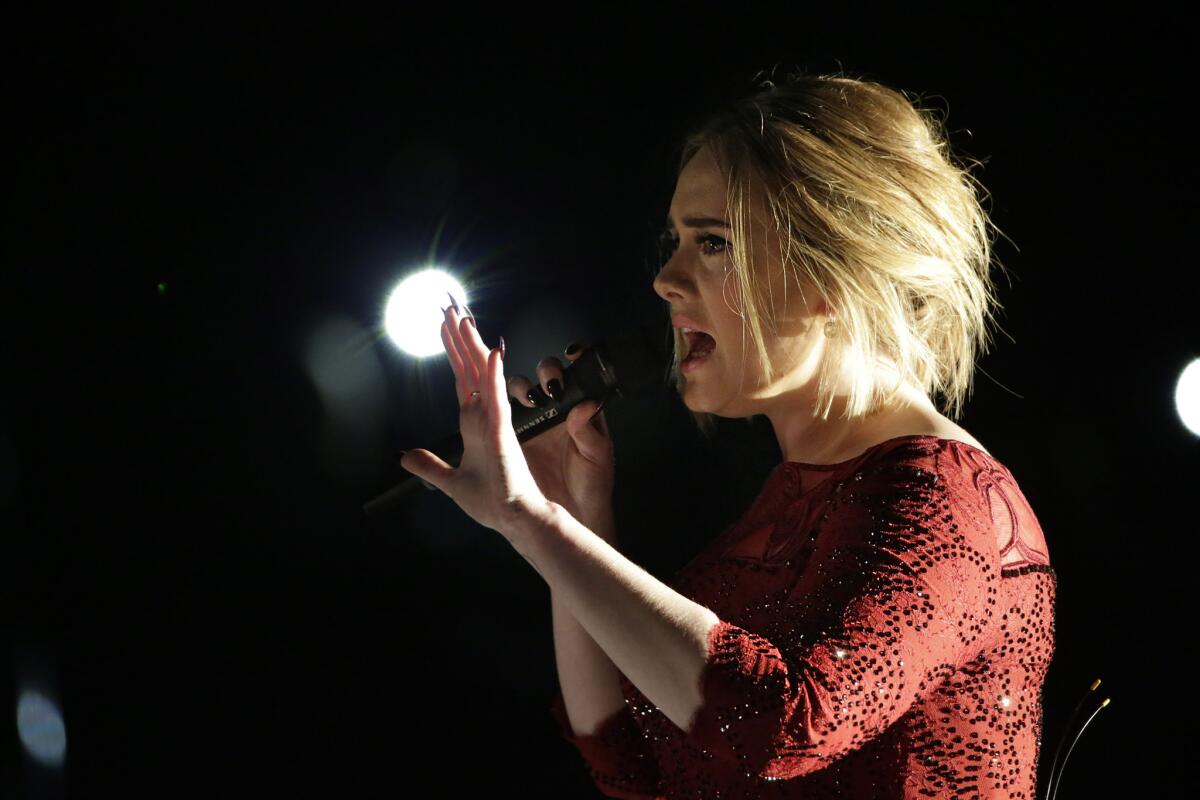Why Adele’s Grammy Awards disaster was actually just what we wanted

Adele performs at the 58th Grammy Awards in Los Angeles.
- Share via
“The more successful I get, the more pressure there is.”
That’s Adele responding to a question from Ellen DeGeneres about whether she still experiences stage fright. On Wednesday the British singer visited DeGeneres’ talk show for an interview scheduled to air Thursday, and of course their conversation revolved around Adele’s performance on Monday’s Grammy Awards.
In case you didn’t hear, the performance didn’t go well.
But what is the nature of the pressure that Adele feels? Sure, the massive success of her album “25” — which has sold more than 8 million copies and is virtually guaranteed to win all of next year’s Grammys — means that she’s got countless eyes on any move she makes in public.
And sometimes that move is, well, not a move at all: It’s standing in one spot on a stage, as she does, and blasting an audience with her hugely powerful voice.
When this is the task before Adele, it’s true that we expect greatness from her — even more greatness, as she suggested to Ellen, than we did back before she’d rescued the music industry from certain death.
See the most-read stories in Entertainment this hour >>
Yet the thing that really drives Adele’s success isn’t her superhuman voice; it’s the idea that such a voice belongs to a regular human, one with fears and insecurities just like the rest of us. More than her ability to nail a note, it’s Adele’s perceived relatability that inspires people to plunk down $10.99 to buy her record on iTunes (where “25” sat at No. 1 early Thursday, less than 72 hours after her supposed Grammys fail).
In this way, it’s easy to view her iffy performance as a boon, since it’s the thing that allowed her to work her real superstar voodoo, which is the endearing fallibility she displayed on “Ellen,” as well as in a couple of tweets immediately after the Grammys.
“I’m treating myself to an in n out,” she wrote in one of them. “So maybe it was worth it.”
Perhaps the pressure on Adele, then, is to retain that low-key charm even as she ascends into ever more rarefied air. What we demand from her isn’t perfection (as we do with Beyoncé) but perfection coupled with its opposite.
Which on one hand resembles a kind of pop-star liberation: We just want Adele to be her lovable self, we tell ourselves, without having to worry about presenting a carefully managed image. We just want her to relax.
In reality, we expect just as much from Adele as we do from Beyoncé — and Adele keeps serving it up.
On “Ellen,” Adele said she spent most of Tuesday crying about the Grammys. But what if she hadn’t admitted that? What if she’d just cried her eyes out all by herself and not made any sort of statement about it?
Then it wouldn’t have satisfied us, is what. If we want Adele to relax, we want her to relax for us, as just another performance.
And then, of course, we want more perfection.
For proof of that, just look at Rolling Stone’s write-up of the singer’s “Ellen” appearance, which also includes a live rendition of “All I Ask,” the song she flubbed on the Grammys.
“‘25’ singer delivers pitch-perfect mulligan performance,” the website’s headline reads, even though that’s clearly not the case (as you can see for yourself.) Her singing in the redo isn’t flawless; she definitely hits some wobbly notes, if not quite as many as the other night.
But without a quick return to glory, where is Adele supposed to go next?
Twitter: @mikaelwood
MORE:
Adele’s to-do list these days? ‘My main thing is Mum, then it’s me, then it’s work’
The Recording Academy’s president explains Rihanna, Adele and everything else that went wrong
Grammys 2016: Who won, who lost, who performed
More to Read
The biggest entertainment stories
Get our big stories about Hollywood, film, television, music, arts, culture and more right in your inbox as soon as they publish.
You may occasionally receive promotional content from the Los Angeles Times.











